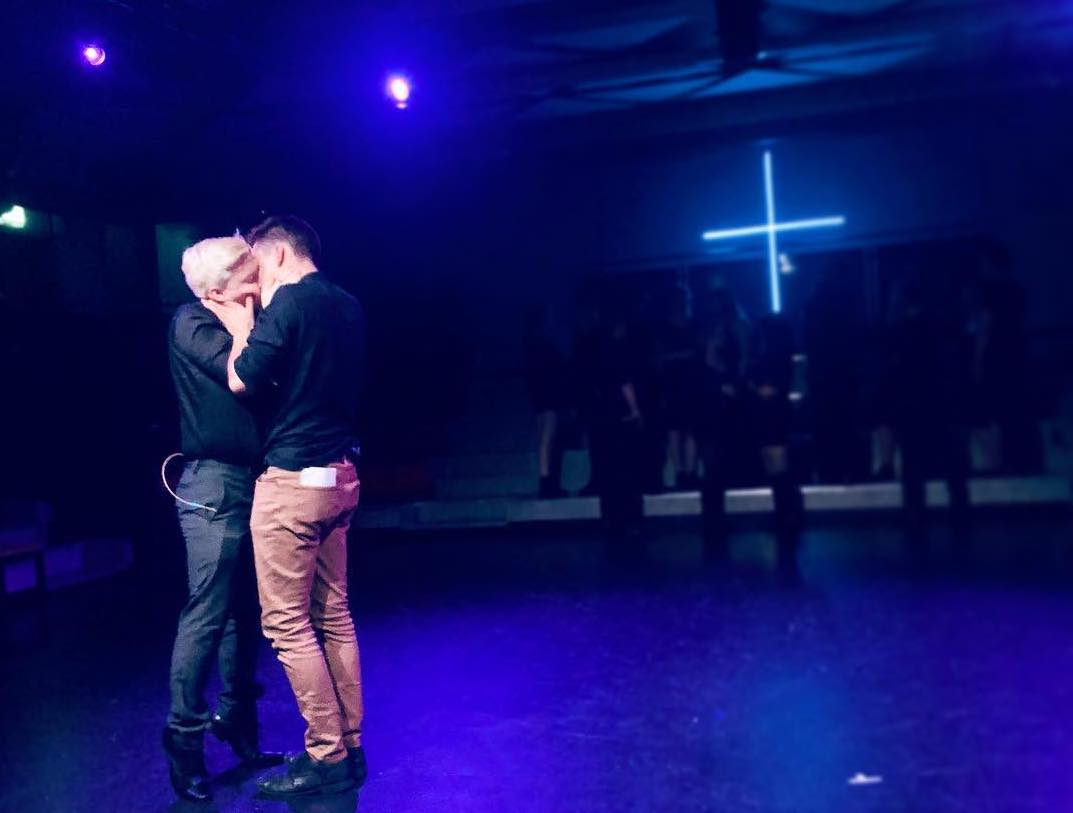In Music Theatre Society’s Bare, directed by James Marsh, a group of Catholic school students navigate the complexities of their faith along with their own coming-of-age woes, dealing with themes like teenage pregnancy, drug use, sexuality and bullying. Along with more conventional and at times predictable plot points, fear not: there was also a slightly awkward rave scene, a penis-shaped piñata and a sassy Sister who appears to Peter as the Virgin Mary.
No one struggles more in the play than Peter, who has been having a clandestine relationship with the growingly distant Jason. Where Peter is open to revealing their relationship, Jason is more fearful of the repercussions, which perhaps drives him to sleep with Ivy, an insecure yet popular classmate. When all his transgressions threaten to pile up on him, Jason falls down a dangerous, self-destructive path that results in tragedy.
The highlight of Bare, and boy was it a highlight, was the calibre of the singing – the cast’s voices were nothing short of phenomenal. If I had to pick standouts, I’d particularly commend Fen Greatley-Hirsch’s dulcet vocals as Peter, the brilliant Kiera Leaper as Ivy, Tash Berg’s no-nonsense YAS QUEEN belts as Sister Chantelle, and Shaunagh Kelly’s hilariously sardonic Nadia. The cast were arguably the strongest, though, in the ensemble numbers, with each character working perfectly together to deliver songs that fizzed with energy.
While Greatley-Hirsch gave a convincing, heart-wrenchingly emotive performance as the lovesick Peter, his love interest Jason, played by Ed Harrison, didn’t quite match up. Harrison’s delivery in Act 1 in particular seemed a little lacklustre, though a brilliant solo near the end of Act 2 changed my mind and he did end the show convincing me with his inner torment – I just wished I could have seen it throughout in his too-cool-for-school opening scenes. Emily Taylor’s performance as Peter’s torn mother Claire was also incredibly strong, and the aforementioned Sister Chantelle was a total favourite and the name on all audience member’s lips post-show, injecting some much-need comedy into the sombre piece.
The weaker points of the show weren’t anything to do with the actors or the direction, but more on the production side. Although I’d guess the set was deliberately, pardon the pun, bare, I didn’t feel fully convinced that I was looking at a theatre set, focusing more on shoe scuff marks on the floor from previous rehearsals and the theatre’s seating stacked to one side, bringing me out of the illusion completely. Just having lockers in one corner and an LED cross felt a little lazy, and the production value was lacking, considering how high-energy the actors’ performances were. There was also white tape stuck on the floor, which looked messy; this could have been to signal lighting spots for the cast, but actors still struggled to find the light and the spotlights where either too small or too harsh, and this led to some issues. This may, however, be down to Pyramid Theatre’s lighting rig, which notoriously isn’t the best.
I couldn’t decide whether the live band (who were brilliant) were too loud, or if the cast’s microphones were too quiet, but in a lot of the ensemble numbers diction was poor and it was hard to figure out what was being said, particularly in the show’s first fifteen minutes where I was left guessing about the plot. Other nit-picky notes would be microphone packs facing the wrong way, so the red light was showing in blackouts and – call me old-fashioned – but it’s a bit distracting when actors are wearing blinding highlighter on their cheekbones.
With these minor criticisms aside, I was blown away by the talent onstage and how deftly the group were able to explore such difficult themes with grace and sensitivity. An emotional ending, contrasting with the upbeat rock score, packed a real punch, and overall the play was a brilliant musical feat.
Steph Green
Image Courtesy of LUU Music Theatre Society

